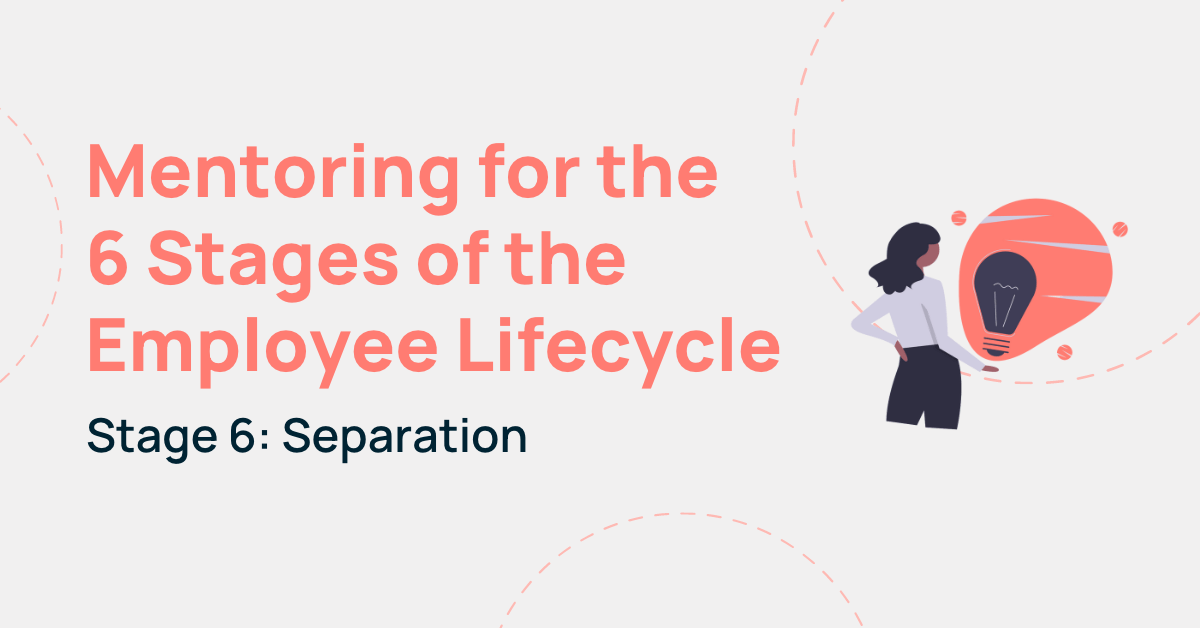The time has come. We’ve arrived at the last instalment of our “Mentoring for the 6 Stages of the Employee Lifecycle” series.
If you’ve already successfully incorporated your mentoring program in the following stages of your business…
Then you’re ready for the last and final stage: your employee’s exit.
Now, you may be wondering why a mentoring program would be beneficial during a team member’s separation from your company.
Let’s first take a look at why making the transition as easy as possible for your people is so important, and then how a mentoring program can help.
The Importance of Employee Separation Management
In this digital age, it’s important to ensure your employees leave with a positive impression of your company. Whereas before the internet age, negative feelings about your organisation may have only travelled via word of mouth, today they can be virtually shouted from the rooftops. Employer review websites like Glassdoor, Jobcase, Blind, Comparably, and more make it easy for people to air out their dirty laundry—or sing your company’s praises.
And what’s the last impression they have of your business before they go? Their separation. This is why it’s so important to ensure your employees leave with a good taste in their mouths. Unfortunately, not many organisations are good at doing this.
According to a Gallup exit study of US workers, at 45%, less than half of exiting employees said they were satisfied with how their organisation handled the exit process. That’s a disconcerting number. An employee’s exit cannot only serve as an opportunity to make them feel as if their time spent at your company was meaningful and worthwhile. It can also be a chance to gain crucial feedback and impart organisational knowledge.
Employee separation management is never easy, whether it’s due to resignation, termination or retirement. The process can be stressful for both employers and employees. However, finding ways to manage employee separation can help ease the stress and ensure that the transition happens as smoothly as possible.
This is why effective employee exit management is essential for any organisation that wants to maintain a positive employer brand and reduce the impact of employee departures.
The good news is that this transition process can be made much smoother by utilizing the power of mentoring.
So let’s delve into the importance of mentoring for employee separation management, how it can reduce stress, and the different roles it can play in creating a smoother transition for all.
The Role of Existing Mentoring Relationships For Employee Separation Management
During an employee’s exit, mentoring provides a support system during a time of change, promotes the transfer of skills and knowledge, and ensures a smooth transition process.
Mentors can act as sounding boards for departing employees, offering advice and guidance to navigate through the challenges of separation. It offers departing employees a chance to discuss their concerns and fears with someone who has most likely already gone through a similar process. Mentors can provide valuable guidance and support, helping their mentees navigate the change and prepare for what’s ahead.
Mentors can also help identify and provide insight into an employee’s reasons for leaving. This information can then be used by the organization to improve retention efforts and retain high-performing employees in the long run.
Mentoring can also benefit the mentor themselves. By helping an employee through the separation process, mentors develop their leadership and coaching skills. It can also provide an opportunity for the mentor to reflect on their own experiences and learn from the employee’s perspective. This can lead to personal and professional growth for the mentor, as well as a stronger relationship with the departing employee as they embark on a new path.
Mentoring also ensures that employees transition out of the organization with grace while minimizing disruption in the workflow. Existing mentoring programs help prevent unwanted situations such as scrambling to fill a gap when an employee leaves.
Mentoring During Employee Exits Benefits the Employer Too
Mentoring is an effective way to show employees that they are valued and appreciated, even as they leave the company. By providing them with guidance and support throughout the transition, employers can leave a positive impression on departing employees, ensuring they leave on good terms, and continue to be ambassadors for the company even after they’ve gone. This can lead to potential future collaborations or referrals, and can also help to maintain a positive reputation for the company as a supportive and caring employer.
By reducing employee exit stress, companies can also minimize the negative impact of high turnover rates, such as decreased productivity and increased recruitment costs. Furthermore, mentoring can help identify areas for improvement within the company, as departing employees may provide valuable feedback and insights to their mentors. This feedback can be used to make changes and improvements to the company culture, policies, and procedures, ultimately leading to a more positive and productive work environment for all employees.
By providing departing employees with support and guidance, the company can maintain a positive relationship with them even after they leave. Former employees who have had positive experiences with mentoring during their separation process are more likely to speak positively about the company and recommend it to others. This can lead to a stronger employer brand and increased employee retention rates.
Keeping Organisational Knowledge with Mentoring
Especially when more seasoned employees decide to leave, companies can experience “brain drain” – a loss of organisational knowledge that their departing team members take with them. With a mentoring program in place, these employees will be able to share such valuable insights and institutional knowledge with their mentoring partners before they leave. This type of scenario is perfect for flash—also known as “just-in-time”—mentoring.
Flash mentoring refers to short-term mentoring relationships that can last anywhere from a day, to a week, to a few months. The intent is to provide very specific, short-term support during times when it is needed the most. Times like when someone is about to leave your company.
These short, flash mentoring pairings can be carried out during the departing employee’s notice period. They can then spend this time sharing their invaluable knowledge and feedback with their team, manager(s), replacement, and other stakeholders.
How Mentoring Can Reduce Employee Exit Stress
Employee exit stress is common and can impact both the employee and the employer. When an employee decides to leave a company, they may experience a combination of emotions including anxiety, sadness, and uncertainty. This can also be true for the employer, who may worry about finding a replacement and ensuring all tasks are covered during the transition phase.
Mentoring can help to reduce employee exit stress for both the outgoing employee and the remaining employees. A mentor can support the employee through the exit process, helping them to transition in a more positive way. The mentor can also help to identify any concerns or issues and work with the team to address them. This can help to ease anxiety and create a more supportive environment for all.
Additionally, mentoring can also benefit the remaining employees by providing them with a sense of stability and support during a time of change. The mentor can help to ensure that the remaining employees are aware of any changes in responsibilities or tasks, and can provide guidance and support as needed. This can help to reduce any feelings of uncertainty or stress that may arise from the departure of a colleague.
Using Mentoring to Smooth Transitions During Separation
Using mentoring during an employee’s notice period can help employees prepare for their exit in a more positive way, by focusing on the skills they’ve gained and the experiences they’ve had during their time with the company.
Mentors can also help employees create an exit plan and identify goals for their next career steps. This can help make their transition smoother and ensure that they are prepared for what’s ahead. Mentoring can also provide departing employees with a sense of closure and a chance to reflect on their time with the company, leading to a more positive exit experience.
Employers can also utilize mentoring to assist with knowledge transfer, delegation of tasks, and identification of critical projects. Departing employees can take on the role of a mentor and share their knowledge and experiences with the remaining team members, allowing them to take on new responsibilities and develop their skillset during a transitional phase.
In addition, during this process, the departing employee can provide guidance and support to the remaining employees, ensuring that a shift in responsibilities does not cause disruptions in workflows and existing ongoing projects.
Conclusion
Employee separation management is difficult but it’s important. However, with the use of mentoring, it can be smoother and less stressful. Mentoring offers support, knowledge transfer, delegation of tasks, and critical project identification. It also provides insight into the reasons behind employee departures, allowing the organization to make strategic changes to retain and develop its high-performing employees. Ultimately, effective separation management is crucial for any business, and mentoring is a valuable tool in achieving that goal.
Furthermore, mentoring can also benefit the remaining employees by boosting their morale and motivation. When employees see that their organization is investing in their development and growth, they are more likely to feel valued and committed to their work. Mentoring can also help identify potential leaders within the organization and provide them with the necessary skills and knowledge to take on more significant roles in the future. Overall, mentoring should be seen as a valuable tool in not only employee separation management but also in promoting employee retention and development when people leave.
How Mentorloop Makes Your Life Easier
Mentorloop’s mentoring software can make setting up such short-term mentoring partnerships easy and straightforward. We’ll help you quickly connect your exiting employees with the relevant team members. Think of these short-term mentorship pairings as exit interviews on steroids.
And—as you know by now after having read our entire series—that’s not the only stage of the employee lifecycle where a mentoring program can help. We hope this series has given you practical, actionable ideas about how you can leverage mentoring to enrich every stage of your employees’ journeys with your company.
If you’re ready to learn more about how Mentorloop can help, check out our Enterprise solution to see how we prioritise the employee experience every step of the way.
Ready to find out how mentoring can enrich your employee experience? Learn more about Mentorloop Enterprise today.


![[Webinar Kit] Mentoring for the 6 Stages of the Employee Lifecycle Learn how to make mentoring a core part of the employee experience and why it pays off at every stage.](https://no-cache.hubspot.com/cta/default/4058869/interactive-189627182868.png)


